 Petzlover
Petzlover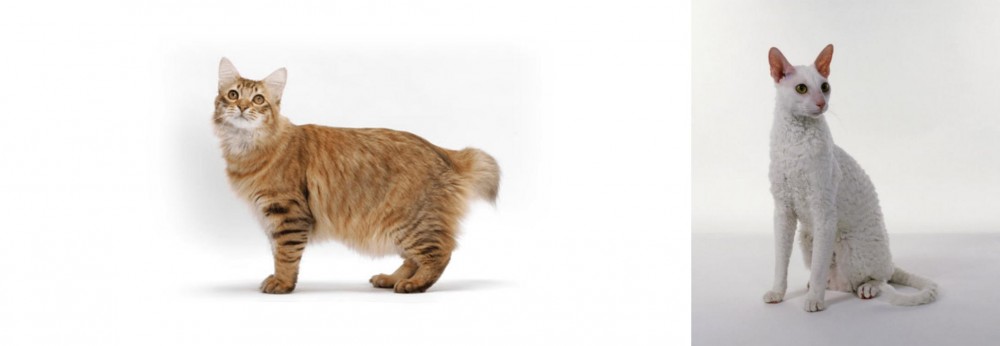 American Bobtail is originated from United States but Cornish Rex is originated from United Kingdom. Both American Bobtail and Cornish Rex are having almost same weight. Both American Bobtail and Cornish Rex has same life span. Both American Bobtail and Cornish Rex has same litter size. American Bobtail requires Moderate Maintenance. But Cornish Rex requires Low Maintenance
American Bobtail is originated from United States but Cornish Rex is originated from United Kingdom. Both American Bobtail and Cornish Rex are having almost same weight. Both American Bobtail and Cornish Rex has same life span. Both American Bobtail and Cornish Rex has same litter size. American Bobtail requires Moderate Maintenance. But Cornish Rex requires Low Maintenance
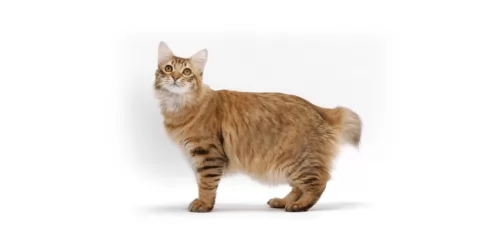 Bobtailed cats have a naturally shortened tail due to natural genetic mutation. The cat’s original appearance genetics were modified so as to bring about an improved strain that comes in all colors and coat types.
Bobtailed cats have a naturally shortened tail due to natural genetic mutation. The cat’s original appearance genetics were modified so as to bring about an improved strain that comes in all colors and coat types.
The cat descended from a short-tailed kitten, Yodi. His kittens also had a short tail. Two women selectively bred the cats to be large and strong with a wild look but with a pleasant nature.
The cats used in the development of the breed were domestic shorthairs and longhairs. They are now pedigreed cats without tails.
In 1989, the International Cat Association accepted the American Bobtail into its new breed category, giving it full recognition in 2002. They were accepted for registration by the Cat Fanciers’ Association in 2000. This is the world's biggest registry of pedigreed cats.
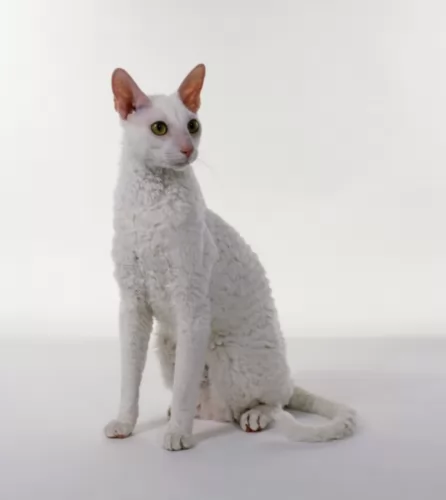 Cornwall is the birthplace of the unusual Cornish Rex cat – a curly-coated cat.
Cornwall is the birthplace of the unusual Cornish Rex cat – a curly-coated cat.
A kitten was born in 1950 and belonged to Nina Ennismore and Winifred Macalister. The other kittens had short hair but this unusual kitten had curly hair, the result of a spontaneous natural mutation.
A successful breeding program was started and it was in 1963 that the American Cat Fanciers Association as well as the and today it is recognized by all cat registries.
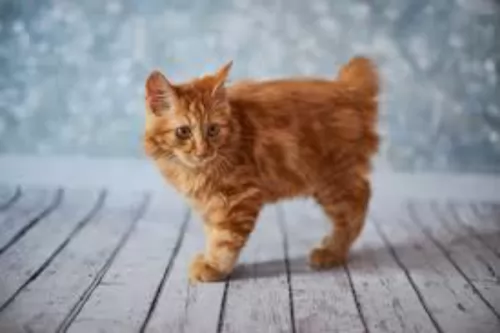 The American Bobtail is a cat that came about in the 1960s. It is well know as the cat with a bobbed tail. It’s not as vocal as many other cat breeds. It’s not a slender cat but is sturdy and and strong weighing between 3 and 7kg. Their double coats can be short- or long-haired. The coat comes in different patterns and colors, including orange, cream, black, brown, chocolate etc with a shaggy texture. He sheds quite a bit. The body of the American Bobtail is faily long. Its ears are medium-sized and wide-based with rounded tips, the eyes are almond shape. The eyes can be gold, yellow, green or blue. What is interesting is that the hind legs are much longer than the fore legs, and the feet are round.
The American Bobtail is a cat that came about in the 1960s. It is well know as the cat with a bobbed tail. It’s not as vocal as many other cat breeds. It’s not a slender cat but is sturdy and and strong weighing between 3 and 7kg. Their double coats can be short- or long-haired. The coat comes in different patterns and colors, including orange, cream, black, brown, chocolate etc with a shaggy texture. He sheds quite a bit. The body of the American Bobtail is faily long. Its ears are medium-sized and wide-based with rounded tips, the eyes are almond shape. The eyes can be gold, yellow, green or blue. What is interesting is that the hind legs are much longer than the fore legs, and the feet are round.
Bobtails are friendly cats, enjoying being in the company of their human family as well as with strangers. They are loving and affectionate to the entire family as opposed to just one person.
They’re quiet cats but will chirp when happy and excited. They get on well with all members of their human family and that includes children and the dogs.
They’re intelligent cats too and they can be taught to walk on a leash and to also perform some tricks. There are some people who say that their Bobtails act more like dogs than cats. These cats are sensitive and can sense when their owners are happy or sad and will come and sit with you when you're feeling sad and alone.
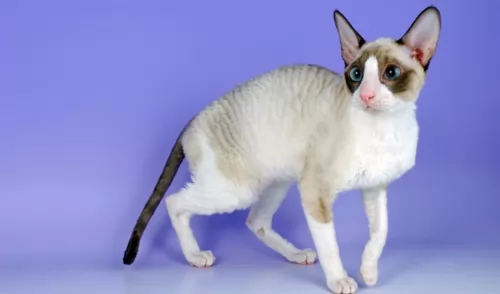 The Cornish Rex is a small to medium-sized cat weighing between 3 to 5kg. It’s a lithe, slender cat with a small, narrow head with big ears and eyes.
The Cornish Rex is a small to medium-sized cat weighing between 3 to 5kg. It’s a lithe, slender cat with a small, narrow head with big ears and eyes.
The cat has long, slender legs with a tail that is also slender and long. The hair is very fine and they are actually prone to hair loss. The coat has fine, short, silky hair. There can be a bit of a curl in the hair, The coat comes in many colors from white, silver, black, red, blue to chocolate and they can have different patterns too as well as bein bi-color.
The eyes can be gold, brown, or green. The torso is long and lean, the cat has a deep chest but strong hips and rear end that allow the Cornish Rex to leap with ease up onto perches.
The Cornish Rex loves his human family and loves spending time with them, whether that means fun and games or sitting in your lap.
He is intelligent and can learn a few tricks and is capable of learning to walk on a leash. He is a confident cat, playful and entertaining. Gentle and loving, he is a talkative cat, wanting to express his opinion about everything.
He will fit easily into different lifestyles, whether you’re single, a family, or in a retirement home, so long as he is receiving lots of attention.
He isn’t as frail as he looks and can get pretty active and social with children and dogs and may even beat the dog to fetching a small ball.
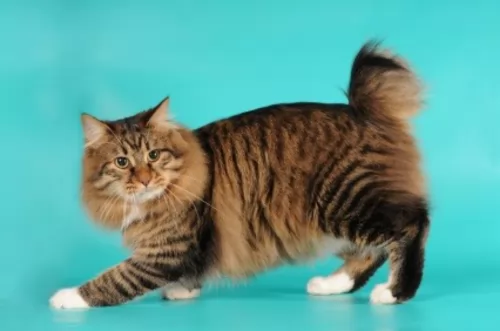 Many people want a dog as a pet but aren’t able to keep one and then the American Bobtail becomes the ideal alternative. These cats aren’t known for their solitary personalities like the many other cats there are and they genuinely love to spend time with their human family. Some will even behave like a dog and be there to meet you at the door when you arrive home.
Many people want a dog as a pet but aren’t able to keep one and then the American Bobtail becomes the ideal alternative. These cats aren’t known for their solitary personalities like the many other cats there are and they genuinely love to spend time with their human family. Some will even behave like a dog and be there to meet you at the door when you arrive home.
He is a fairly large, amicable cat and is affectionate and adaptable to your lifestyle. He enjoys all kinds of lifestyles and loves to curl up next to you on your travels, being the perfect road trip companion.
The American Bobtail is a therapeutic cat and is sensitive to the moods of its human family. He gets on well with children and other pets in the family and just wants to be a family member.
By bringing an American Bobtail into your home and your heart, you’ll have discovered the most wonderful feline companion there is.
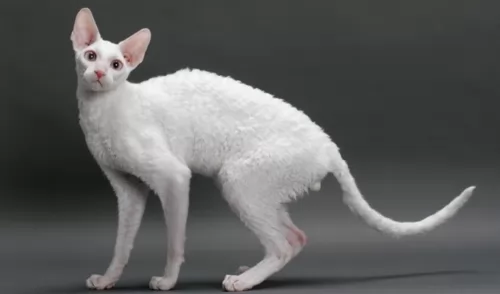 If you’re looking for a cat that can bring laughter and fun into the household, you won’t go wrong with a Cornish Rex as they will amuse and delight.
If you’re looking for a cat that can bring laughter and fun into the household, you won’t go wrong with a Cornish Rex as they will amuse and delight.
He is also a cat that doesn’t require a lot of fuss and bother, although he makes a fuss about the amount of attention he gets.
He doesn’t like being left alone for long, so a good idea is to work from home or to get a companion for him. Other than than, he makes the most splendid feline companion.
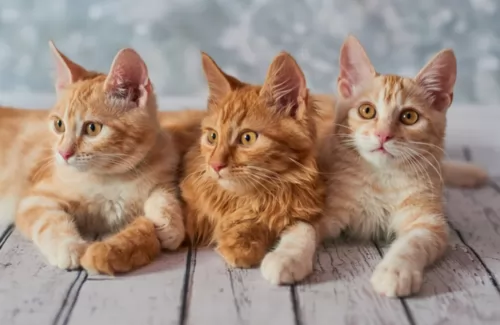 When you buy a kitten from a breeder, always do research on the breeder so as to avoid a host of health issues down the line.
When you buy a kitten from a breeder, always do research on the breeder so as to avoid a host of health issues down the line.
Apart from the typical cat health problems, the Bobtail is a healthy breed of cat. With proper care from you at home as well as veterinary care, these interesting looking cats can live up to anything between 12 and 20 years.
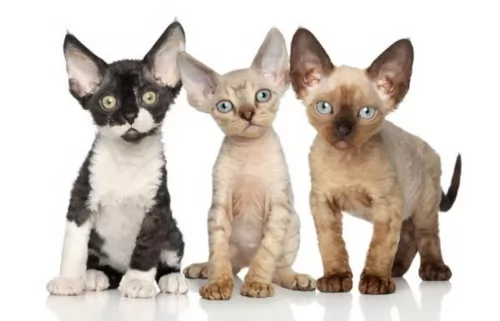 The Cornish Rex is a hardy cat with very few health issues. Certainly, because of the very fine hair, you’d have to be aware of sunburn.
The Cornish Rex is a hardy cat with very few health issues. Certainly, because of the very fine hair, you’d have to be aware of sunburn.
Cats can get sunburned and can be at serious risk of getting skin cancer later on. Be sun-smart and apply pet sunscreen.
Be careful of the type of sunscreen you use as your cat will likely want to lick it off. Other issues to look out for are hypertrophic cardiomyopathy. This is a common kind of heart disease in cats where there is a thickening in the wall of the heart.
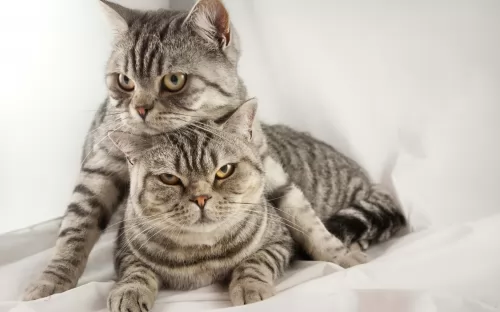 Keep a close eye on your cat’s weight.
Keep a close eye on your cat’s weight.
Keep the litter box of your Bobtail scrupulously clean.
Your American Bobtail needs the best quality food there is full of vitamins and minerals if he is to remain healthy. The cat’s diet will depend a lot on his activity levels and general health, but it should always be high protein food. Your vet will always help you with some guidelines on feeding your cat.
Every cat needs exercise, and even though these cats aren’t as energetic as other cats, they are active indoors and out and are also playful. You will need to provide it with some puzzle toys and a climbing tree to keep him mentally and physically active.
Brush his medium-length fur twice a week to keep it shiny and silky.
Trim his nails carefully and check his eyes and inside his ears for abnormal discharges.
Vaccinate your cat to keep it protected from life-threatening cat diseases and take him to the vet immediately you suspect something is wrong.
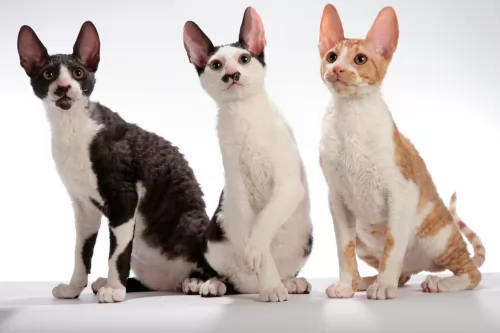 Grooming your Cornish Rex isn’t going to be an issue as the cat has very little hair. Although nothing is set in stone and some Cornish Rex’s have thicker coats, requiring more brushing. Maybe a soft brush once a week will be sufficient for this cat breed.
Grooming your Cornish Rex isn’t going to be an issue as the cat has very little hair. Although nothing is set in stone and some Cornish Rex’s have thicker coats, requiring more brushing. Maybe a soft brush once a week will be sufficient for this cat breed.
A good idea is to take a cloth of warm water and to gently wipe your cat so that he is free of dust.
Supply a litter box and make sure that you remove his droppings every single day.
Have your pet neutered or spayed if you don’t want unwanted kittens. These minor ops have many health benefits for your cat as well.
When you brush your cat, check his entire body out for any abnormalities. Check for new lumps, check inside the ears to make sure they are clean and free of redness which could indicate an infection.
Clip his toenails, make sure his eyes are clear and bright, free of discharge, and check inside his mouth to make sure there aren’t any bad teeth, as this could cause him a lot of discomfort.